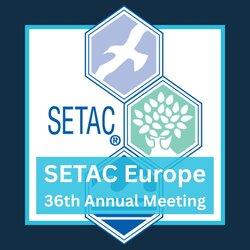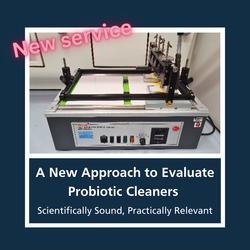February 3, 2026
SETAC Europe 36th Annual Meeting: Dr. Brill Regulatory Services and Hydrotox together in Maastricht
Again with strong participation from the DR. BRILL INSTITUTES Group, the SETAC Europe 36th Annual Meeting will take place in Maastricht from May 17-21, 2026, under the theme "Embrace the Outlier: In Science, Regulations, and Networks." Dr. Brill Regulatory Services GmbH and Hydrotox GmbH will both be involved, both in terms of personnel and content – and, following last year's great success, we will once again have our own exhibition stand!
Our commitment in detail:
Exhibition booth - Booth No. 37: Hydrotox and Dr. Brill Regulatory Services will once again be represented with a joint booth at the SETAC Europe Annual Meeting.
Presentation title: Assessment of Endocrine Effects of Construction Products in the Environment
Presentation type: Poster
Session title: 6.04 - Endocrine Disruption: Scientific and Regulatory Challenges
Presentation day: Monday, 18 May 2026
Authors: Elena Perabo, Martina Springmann - Hydrotox GmbH, Freiburg i.Br.
Co-Author: Dr. Peter Behnisch - BioDetection Systems b.v., Amsterdam
Presentation title: Biodegradability of Polymers in Aquatic Test Systems: ISO 14852 - Feasibility Study for Different Concentrations of Test Item and Inoculum
Presentation type: Poster
Session title: 3.18 - Microplastics Research: Beyond Fear-Mongering, Towards Trustworthy Science
Presentation day: Monday, 18 May 2026
Authors: Andrea Brunswik-Titze, Jessica Bühler, Marie Canon - Hydrotox GmbH, Freiburg i.Br., Germany
Presentation title: Sustainable green roofs for the implementation of the sponge city: Determination of ecotoxicologically safe construction products for green roofs
Presentation type: Poster
Session title: 3.09 - Environmental Forensics: Tracking Sources and Evaluating the Effects of Chemicals in Urban and Other Environments
Presentation day: Tuesday, 19 May 2026
Authors: Elena Perabo, Dr. Christoph Hafner - Hydrotox GmbH, Freiburg i.Br., Germany
Presentation title: Round Robin Test to prepare for consolidation of tests for ready biodegradability according to OECD 301/310
Presentation type: Poster & Poster Corner Discussion
Session title: 3.04 - Advancing Understanding of Environmental Persistence of Chemicals
Presentation day: Tuesday, 19 May 2026
Authors:
Ulrich Jöhncke - UBA, Section IV 2.3. Chemicals
Andrea Brunswik-Titze - Hydrotox GmbH, Freiburg i.Br.
Stefan Gartiser - Hydrotox GmbH, Freiburg i.Br.
Daniel Sättler - UBA, Section IV 2.3. Chemicals
Monika Ratte - ToxRat Solutions GmbH & Co. KG, Alsdorf
Benjamin Daniels - ToxRat Solutions GmbH & Co. KG, Alsdorf
Presentation title: Comparison of exposure modelling tools used in different regulatory areas
Presentation type: Poster
Session title: 3.02 - Advances in Exposure Modelling: Closing the Gap between Scientific Innovation and Regulatory Relevance
Presentation day: Wednesday, 20 May 2026
Presenter: Heike Schimmelpfennig
Our colleagues on site are already looking forward to welcoming what we hope will be a large number of our customers, as well as potential new customers, to our attractive booth - Booth No. 37. If you would like to arrange an appointment in advance, please feel free to contact us, e.g., by email here: info@brillhygiene.com
Use your participation in the SETAC Europe Annual Meeting for a personal meeting with us! The following colleagues will be present in Maastricht: From Dr. Brill Regulatory Services Dr. Gunnar Kleist (Director Regulatory Services) and Heike Schimmelpfennig (Senior Manager Regulatory Affairs), as well as from Hydrotox Andrea Brunswik-Titze (Team Leader and Test Leader Biodegradability), Jessica Bühler (Study Director Biodegradation), Elene Perabo (Test Leader Ecotoxicology, Third Party Research Projects) and Dr. Christoph Hafner (Head of GLP Test Facility, Customer Support).
One-day free tickets: Hydrotox has a small number of SETAC one-day free tickets available, which we would be happy to pass on to you. If you are interested, please contact Dr. Christoph Hafner directly by email at hafner@hydrotox.de.
The SETAC Europe Annual Meeting is an annual conference of the Society of Environmental Toxicology and Chemistry (SETAC) Europe that brings together scientists, policy makers and industry representatives to discuss current issues in the fields of environmental toxicology, ecotoxicology and environmental chemistry.
Main features of the conference:
Topics: Environmental risk research, life cycle assessment, regulatory developments and scientific policy advice
Formats: Scientific sessions, plenary lectures, training sessions and networking events
Participants: 2,000-2,500 experts from over 60 countries
The conference serves as a platform for the exchange of new findings and promotes cooperation between research, industry and authorities.
Link: SETAC Europe 36th Annual Meeting











